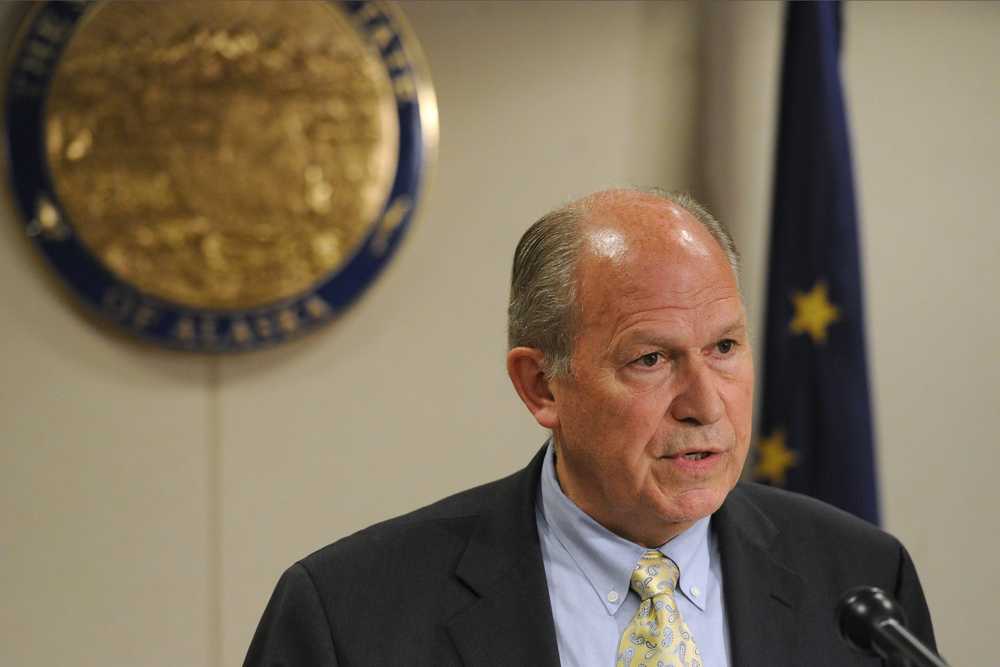JUNEAU, Alaska — Gov. Bill Walker warned Monday that about 15,000 state employees could be laid off amid a continued budget showdown with the Legislature and an escalation of the debate over whether the special session will be held in Juneau or moved to Anchorage.
Lawmakers late last month passed a partially funded budget for the fiscal year beginning July 1 after the House failed to garner the support needed to access a reserve fund to cover costs. Ahead of a Tuesday deadline, Walker said Monday that he vetoed parts of that budget, giving priority for anticipated available revenues to areas such as public safety and health. The Legislature’s budget was left intact and money would be available to pay the state’s debt obligations, Walker said, while other areas would see deep cuts.
The worst-case scenario is that lawmakers fail to reach agreement on a deal by July 1, resulting in about 15,000 workers being laid off.
It would also be the start of a shutdown of government operations not necessary to protect the life, health and safety of Alaskans, he said.
The budget package included items for the remainder of the current year and for the coming fiscal year. Walker said he accepted the part of the package that includes items and funding for the rest of this fiscal year, including the use of money previously set aside for education to help cover costs through June 30. Had the entire package been vetoed, everything would have come to an immediate halt, Walker’s budget director Pat Pitney told reporters during a news conference in Anchorage.
Lawmakers had cited confusion on how to proceed on the budget given there was still a live, viable budget in play. Walker also had introduced a new budget bill for the special session, largely similar to what lawmakers passed but which also includes more funding in areas the administration believed were cut too deeply, such as education, as well as Medicaid expansion. The difference in spending between the two is about $94 million, not including federal money.
Walker said lawmakers could have fixed the budget they passed or worked off the plan he proposed to jump-start talks.
Walker said he was hopeful an agreement could be reached before the scheduled end of the special session next week. But talks to that end have shown little sign of progress.
Support from the Democratic-led House minority is needed to tap the constitutional budget reserve fund. The budget passed by lawmakers cut education funding and rejected negotiated union pay increases, moves that the minority opposes. Minority members also want expanded Medicaid, something the Republican-led majorities have indicated they will not advance during the special session.
Legislative leaders have balked at adding to the budget given the multibillion-dollar deficits the state is facing amid low oil prices. Minority ideas to offset the costs of items they want in the budget, such as capping the payout of oil tax credits and redirecting funds for some infrastructure projects, have been nonstarters with the majority.
Reaching an agreement “looks pretty bleak right now,” said House Minority Leader Chris Tuck, D-Anchorage.
The shutdown talk comes even though the state has billions of dollars in reserves. Aside from the constitutional budget reserve, which calls for a three-quarter vote in each the House and Senate to access, there are pots of money available that are more easily accessible but politically could prove tricky, such as the Permanent Fund earnings reserve account or money set aside for student scholarships and a rural energy program.
Walker told reporters the administration “won’t be particularly judgmental” on the source of money to fully fund the budget. Tuck said minority members would not support using the Permanent Fund earnings reserve account.
Also on Monday, the Alaska House and Senate announced they plan to start holding floor sessions in Anchorage, starting Thursday.
A handful of House and Senate members have met for brief floor sessions in Juneau every few days to satisfy meeting requirements after sessions resumed following an 11-day recess last Tuesday. Attendance was not required because there was nothing to vote on. Most hearings have been held in Anchorage.
The Capitol is undergoing scheduled renovation work. Members of the Juneau delegation have said alternate space would be available if Capitol rooms are not suitable. A Walker spokeswoman said by email that members of Walker’s Juneau staff continue to work at the Capitol.
Senate President Kevin Meyer, R-Anchorage, said that while he intended to reconvene in Juneau, it makes sense given the noise at the Capitol and cost of flying everyone back to Juneau to hold sessions in Anchorage. He said he couldn’t see Walker challenging lawmakers on that point.
Walker said his special session location preference is for Juneau.

